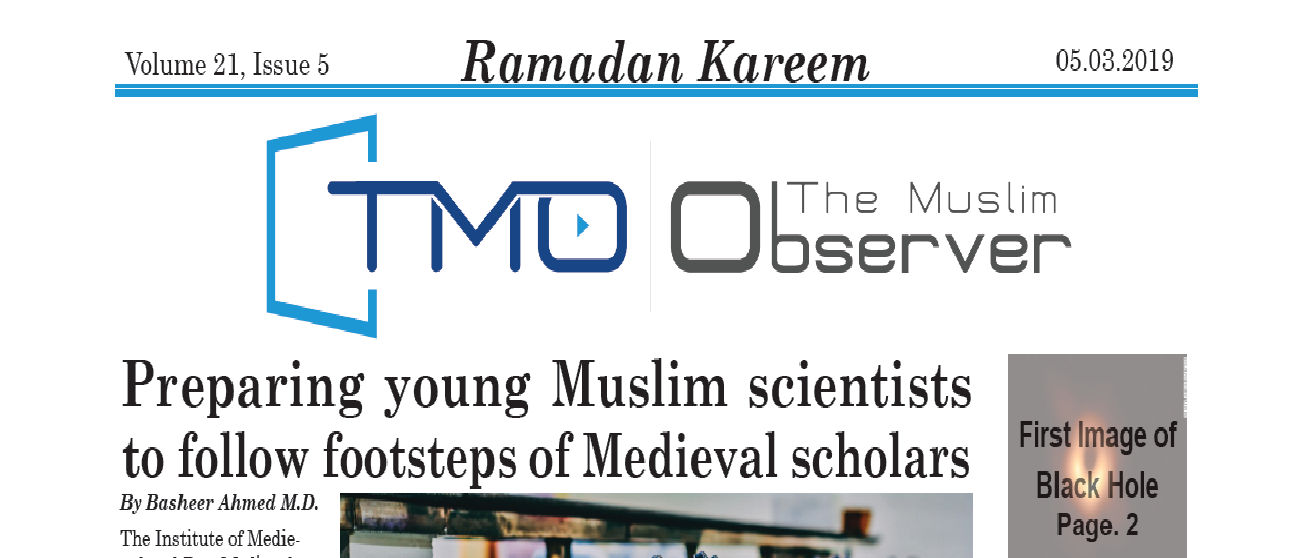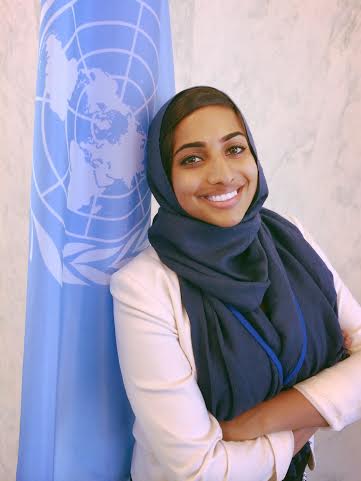SE Michigan (V9-I14)
Dinner and Silent Auction for the Children of Sudan
By Dana Inayah Cann, MMNS
March 22–Dearborn–Amnesty International presented a silent auction and dinner on the campus of U of M Dearborn titled Orphans of Sudan: Suffering Behind the Shadows of War. The event was sponsored by Amnesty International of U of M Dearborn, the Quaker Oats Company, Islamic Relief, U of M Credit Union, Multicultural Association, Muslim Students’ Association at the U of M Dearborn and ASU.
Hosting the event with over one hundred people in attendance were Jozefina Kalaj and Abdullateef Muhiuddin.
Before the start of the event, a Powerpoint presentation was shown of the people of Sudan. Pictures included a woman in tears, dead bodies laid out in the dirt, and places that looked destroyed. The pictures were shown repeatedly throughout the event.
The first speaker was Suliman Giddo, president and CEO of The Dafur Peace and Development Organization. He was born and raised in Sudan. With a Powerpoint presentation, Giddo gave the audience a history of how the war in Sudan was started and how the Sudan government are not stepping in to help.
The war in Sudan began in 1955 after the Arab-led Khartoum government broke its promise to create a federal system for southern Sudan. During the 17 year civil war, 21 ethnic conflicts broke out and all were resolved by Agaweed (traditional mediators). Compensation and forgiveness were given to both sides.
A second civil war broke out in 1983, following the government’s Islamicization campaign, which incorporated traditional Islamic punishments drawn from Shari’a into the penal code. Because these laws were also imposed on southerners and non-Muslims in the north, it led to a civil war that continues still continues til today.
The crimes committed since the war have displaced 3,220,000 from their homes; 400,000 have been killed, and 240,000 refugees are now in Chad.
Giddo stated that everyone should step in to help the people of Sudan since the government of Sudan isn’t doing much. Though a cease fire agreement has been established in 2004, and an African Union Forces unit has created a mission of 36 months in Darfur, no significant security changes have occurred.
There is a “weak mandate, a lack of experience, logistics, confidences, command, communication and funding†according to Giddo.
In order for Sudan to succeed, Giddo says that they should “strengthen African troops, disarm the Janjaweed and rebels, give a fair trial to perpetrators, give fair compensation and repatriation and have political settlement for all states in Sudan.â€
“I believe that war is neither an ideal nor an effective war for conflict resolute. It is not too late to continue peaceful negotiations in good faith,†said Giddo.
Following Giddo’s presentation, the audience ate and went into the adjoining room to view the pictures and make bids for the silent auction.
After dinner and the auction, Professor Saeed Khan of Wayne State University spoke about Sudan and the efforts taken to help.
Saeed stated that the Darfur crisis is not just manmade, but it is also because of natural disaster. 95,000 have lost their lives when the land dried up due to a shortage of rainfall.
“The drought is but a system of what is befalling Sudan,†said Khan. “The Sahara dessert is becoming more dry, which is diminishing the resources for the population.â€
Citing the media for not giving the people of Sudan enough attention, Khan also placed accountability on the Muslim world, wondering if Muslims have a passive look of what’s going on like everyone else. In the past few years, the attentions of Muslims have been in Iraq, Palestine and Homeland Security.
Khan also said that to the U.S., the crisis in Sudan is not an important issue right now, but that other economic resources such as oil in the eastern part of Sudan is.
Khan then went on to talk about how Amnesty International has “been on the forefront, proclaiming and exposing†the crisis in Sudan and asking people to “bear witness to what is happening.â€
“I fear that your children will be talking about Darfur,†said Khan. “You can make a difference for tonight…you can make a difference for the rest of the nights. If you cannot help with your hands you can speak out against it with your own mouth. Bear witness. Speak out.â€
After Professor Khan spoke, members of the audience enjoyed desert, while others left the room to make maghrib.

Caption: Professor Saeed Khan addresses an audience of Muslims and others who are concerned about reported atrocities in the Darfur region of Sudan.
Twenty minutes later, Carmen Middletent, an Australian native who now lives in Detroit, spoke of how she grew up in foster homes before moving to the United States and how a woman inspired her to became an Australian artist. Several pieces of Middletent’s work was donated for the silent auction.
Pamphlets and envelopes were made available for the audience to make donations.
To help support and learn about the people of Sudan, you may contact Amnesty International, Islamic Relief and The Darfur Peace and Development Organization.
CAIR Runs Huge Gala Banquet with Many Prominent Michigan Muslims
By Adil James, MMNS
Dearborn–Sunday March 25–CAIR Michigan and most of Southeast Michigan’s prominent Muslim leadership attended a fundraiser showcasing CAIR’s recent accomplishments, with promienent speakers and imams from the community and abroad in attendance, including the keynote speaker, journalist Robert Fisk.
The event was unusual because it was held during the day, unlike most other such banquets. It was held at the Hyatt Regency in Dearborn, filling a huge banquet hall with 110 tables and about 1,100 guests. Imam Dawud Walid, Executive Director of CAIR Michigan, explained that CAIR was somewhat disappointed with the money that was raised during the event, falling short of its goal. This year’s banquet, despite its elaborate preparation and despite its being very well-attended by all groups of Michigan Muslims, made thousands of dollars less than even last year’s event (which raised about $150,000).
CAIR Michigan needs your support, so you may wish to support them–when you have a problem involving discrimination you will call them–so maybe it is better to help them now, before your hour of need.
Present were many distinguished Muslims, including Imam Qazwini of the Islamic Center of America, Imam Moosa of the Bloomfield Muslim Unity Center, Imam Elahi of the Islamic House of Wisdom, and many others of great stature in the community.
There was a video presentation by CAIR Michigan which showed the many accomplishments of CAIR, and which announced that CAIR had processed 16,000 discrimination cases, engaging anti-Muslim voices on many fronts including callous and stereo-typing anti-Muslim advertising, the pope’s oblique attack on Islam, the use by President Bush of the term “Islamofascist,†(CAIR claimed its advocacy stopped the president from using that phrase), not to mention many cases of employment discrimination and cases of discrimination on airplanes.
Unfortunately, CAIR Michigan, said Dawud Walid, had already received as of late March 2007 the same number of discrimination complaints that it had received in all of 2006–a very disturbing trend. Such complaints involved hate mail to mosques, radio announcements of hatred, hatred directed at Muslim students by ignorant professors, and more. Even 2006 had seen a 30% climb in number of discrimination claims over previous years.
Imam Walid emphasized to the audience at the Hyatt Regency that CAIR does not depend on corporate sponsorships, and is dependent instead on donations from individuals. He thanked the community for its support.
Keynote speaker Robert Fisk spoke eloquently for about 40 minutes on the political and historical dimensions of today’s conflict in Iraq, pointing out historical parallels from the time of the crusades until the present, including the British invasion of the same land.
A fascinating fact he mentioned was that in fact during the crusades the total number of Christian soldiers in the Middle East was, adjusted for population, 22 times less than the total number of soldiers from Christian nations currently based in the Middle East. He decried the incomplete reporting of the major networks on Iraq, saying that every newspaper had failed to get a recent story of a list of insurgent demands that had been announced by a major insurgent group. He described parallels between the current impasse in the Iraq war with previous wars between France and Algeria and other wars. He also emphasized that maps showing different populations (Sunni, Shi’a, Kurds) in different areas are actually the thin end of a wedge that is being driven between the peoples of Iraq–before the war its peoples had lived in peace, but they have since been incited to war with one another. He emphasized also that during the Shah’s time, Iran had been encouraged in its nuclear ambitions. He also went into some detail describing how from the time of Napoleon until the present, the West had offered a democracy of sorts many times to the Middle East–but in fact the democracy they wanted to bring there was not real democracy because many political players were deemed too dangerous to Western interests to allow in power.
After his speech, Mr. Fisk received a long and rowdy standing ovation from the 1100 audience members for his description of current events in their historical context.
Imam Ali Leyla of IAGD held a brief fundraising effort immediately after Mr. Fisk’s speech.
The event was, despite its failure to reach its fundraising target, a tremendous organizational success, showcasing the togetherness, comity, and organizational capacity of Michigan’s Muslim communities.
9-14













2007
1,181 views
views
0
comments